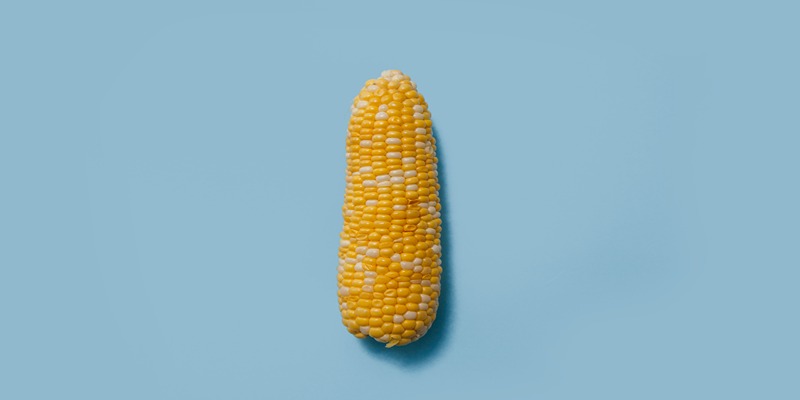Exploring Corn Nutrition Facts and Health Benefits
Dec 05, 2023 By Nancy Miller
The reputation of maize as a healthful and adaptable grain has made it a mainstay in many different cuisines throughout the globe. It has made its way into many different foods, from tortillas to popcorn, and is an essential part of many different civilizations' diets. But there are many health advantages to eating maize beyond just its taste. Maize has an impressive nutritional profile. Exploring the many sides of maize, this article highlights its nutrient-rich makeup and the many health benefits it offers.

Unveiling the Health Perks of Including Corn in Your Diet
Although maize is often appreciated for its delicious flavor and pleasing crunch, its benefits to our health go much beyond that. To better understand this extraordinary grain and make educated decisions about including it in our diets, let's take a look at the health benefits that maize provides. Here we'll take a look at the nutritional profile of maize, discuss its possible health advantages, and show you how to include it in a healthy diet.
Corn Nutrition: A Comprehensive Analysis
Macronutrient Profile of Corn
Corn, a staple food in many diets, offers a diverse macronutrient profile. Primarily a carbohydrate source, it provides energy. Per 100 grams, corn typically contains about 21 grams of carbohydrates, 3 grams of protein, and 1-2 grams of fat, varying slightly among different varieties. The protein in corn is not complete, lacking in some essential amino acids, and thus should be complemented with other protein sources. Its natural sugars give it a sweet taste, making it a favorite in various dishes. The fat content, predominantly unsaturated, contributes to its overall nutritional value.
Vitamins and Minerals in Corn
Corn is a good source of several vitamins and minerals, contributing to its nutritional value. It contains B vitamins, including thiamine (B1), which is essential for energy metabolism, and niacin (B3), important for brain function. Folate, another B vitamin in corn, is crucial for DNA synthesis and repair. Corn also provides a modest amount of vitamins C and E. In terms of minerals, it's a source of magnesium, phosphorus, zinc, and manganese. These nutrients contribute to bone health, immune function, and overall metabolic processes. However, it's important to note that corn's nutrient composition can vary based on the type and how it's prepared.
Dietary Fiber in Corn: Benefits and Importance
Corn is a significant source of dietary fiber, essential for digestive health. The fiber in corn, both soluble and insoluble, aids in bowel regularity, preventing constipation. It also plays a role in maintaining a healthy gut microbiome. Soluble fiber can help in lowering cholesterol levels and regulating blood sugar levels, which is beneficial for heart health and diabetes management. Additionally, the fiber content contributes to the feeling of fullness, which can aid in weight management. Including corn as part of a balanced diet can thus be beneficial for maintaining overall digestive health and preventing chronic diseases.
Health Benefits of Corn: Unlocking the Secrets
Corn's Role in Heart Health
Corn, often regarded as a humble grain, has a significant role to play in promoting heart health. This nutrient-rich grain contains compounds like folate and fiber, which contribute to reducing the risk of cardiovascular diseases. Folate helps lower homocysteine levels in the blood, a factor linked to heart problems. Additionally, the fiber in corn aids in managing cholesterol levels, keeping your arteries clear, and reducing the likelihood of heart-related issues.
Lesser-Known Health Benefits of Corn
Beyond its heart-healthy attributes, corn offers a range of lesser-known health benefits. It is a valuable source of antioxidants like lutein and zeaxanthin, which are essential for maintaining eye health and preventing age-related macular degeneration. Corn also contains essential vitamins and minerals such as vitamin B6, niacin, and phosphorus, which play crucial roles in metabolic processes, energy production, and bone health. By incorporating corn into your diet, you can tap into these hidden nutritional treasures.
Incorporating Corn for a Healthier Lifestyle
Incorporating corn into your diet is a simple yet effective way to enhance your overall well-being. Whether you prefer fresh corn on the cob, canned corn, or cornmeal-based dishes, there are numerous ways to enjoy its health benefits. Try adding corn to salads, soups, or stir-fries for an extra dose of flavor and nutrients. You can also experiment with corn-based recipes, such as polenta, cornbread, or corn salsa, to diversify your meals. With its versatility and nutritional value, corn proves that healthy eating can be both delicious and rewarding.
Making Informed Choices: Corn in Your Balanced Diet
Portion Control and Frequency of Consumption
Incorporating corn into a balanced diet requires attention to portion control and frequency of consumption. Corn, predominantly a carbohydrate, should be consumed in moderation, especially for those monitoring blood sugar levels or managing weight. The standard portion size is about half a cup of cooked corn or one ear of corn. Including corn as part of a varied diet, rather than a daily staple, ensures you benefit from its nutrients without over-consuming carbohydrates. This moderation allows you to enjoy corn's taste and health benefits while maintaining a balanced diet.
Combining Corn with Nutrient-Rich Foods
To maximize the nutritional benefits of corn, combine it with other nutrient-rich foods. Pairing corn with legumes like beans or lentils enhances the protein quality of the meal, as these foods complement the amino acids that corn lacks. Adding vegetables like tomatoes, bell peppers, or leafy greens can increase the meal’s vitamin and mineral content. For a heartier dish, combine corn with lean proteins such as chicken or fish. These combinations not only improve the overall nutritional profile but also offer a variety of flavors and textures, making meals more enjoyable and satisfying.

Creative and Healthy Corn Recipes
Corn can be incorporated into various healthy and delicious recipes. Grilled corn on the cob, seasoned with herbs and spices, offers a tasty and low-calorie option. Corn salads, mixed with a variety of vegetables and a light vinaigrette, make for a nutritious and refreshing meal. For a heartier dish, try a corn and vegetable stir-fry or a quinoa-corn pilaf. Corn can also be added to soups and stews for extra texture and flavor. These recipes provide creative ways to include corn in your diet, keeping meals interesting and healthful.
Debunking Myths: Separating Fact from Fiction about Corn
As with many foods, corn has its fair share of misconceptions and myths that deserve clarification. One common misconception is that corn is devoid of nutritional value, often associated with being a high-carb vegetable. However, as we've explored, corn offers a wide array of essential nutrients, making it a valuable addition to a balanced diet. Another myth suggests that corn is genetically modified (GM) across the board, but this isn't entirely accurate. While some varieties of corn are GM, many non-GM options are available for those who prefer them. It's essential to choose the right corn products that align with your dietary preferences. By addressing these misconceptions and relying on scientific evidence, we can appreciate the goodness of corn in promoting overall health.
Conclusion
Corn is more than just a popular side dish; it's a nutritional powerhouse that can contribute significantly to your well-being. Packed with vitamins, minerals, fiber, and antioxidants, corn offers numerous health benefits, from supporting heart health to aiding digestion. By incorporating corn into your diet and dispelling common myths, you can harness its goodness and enjoy a healthier and more balanced lifestyle. So, embrace the versatility of this versatile grain, and let corn be a staple on your plate, promoting both nutrition and deliciousness.








